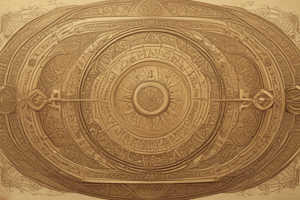Podcast
Questions and Answers
During the Medieval times, the Islamic empire was in its ______ age
During the Medieval times, the Islamic empire was in its ______ age
golden
The Islamic empire made incredible advances in ______ during this time
The Islamic empire made incredible advances in ______ during this time
science
The Islamic empire stretched from the Arabian peninsula east into ______
The Islamic empire stretched from the Arabian peninsula east into ______
China
Muslim scholars translated hundreds of thousands of ______
Muslim scholars translated hundreds of thousands of ______
Understanding the world was both a religious and ______ mission for early Muslims
Understanding the world was both a religious and ______ mission for early Muslims
What are some of the scientific discoveries made during the Islamic golden age?
What are some of the scientific discoveries made during the Islamic golden age?
What was the relationship between religion and science during the early years of Islam?
What was the relationship between religion and science during the early years of Islam?
Why was the Islamic empire well-suited for a golden age of science?
Why was the Islamic empire well-suited for a golden age of science?
What was the geographic extent of the Islamic empire during this time?
What was the geographic extent of the Islamic empire during this time?
What was the role of Muslim scholars in the advancement of science during this period?
What was the role of Muslim scholars in the advancement of science during this period?
What were some of the scientific discoveries made during the Islamic golden age?
What were some of the scientific discoveries made during the Islamic golden age?
Why was the Islamic empire well-suited for a golden age of science?
Why was the Islamic empire well-suited for a golden age of science?
What were the contributions of the Islamic empire to the field of mathematics?
What were the contributions of the Islamic empire to the field of mathematics?
How did the Islamic empire's geographical extent contribute to its scientific advancements?
How did the Islamic empire's geographical extent contribute to its scientific advancements?
What role did religion play in the scientific pursuits of the Islamic empire during this period?
What role did religion play in the scientific pursuits of the Islamic empire during this period?
Flashcards are hidden until you start studying
Study Notes
The Islamic Golden Age
- The Islamic empire was in its golden age during the Medieval times
- The Islamic empire made incredible advances in science during this time
Geographic Extent
- The Islamic empire stretched from the Arabian peninsula east into Persia (modern-day Iran) and beyond
Translation and Scholarship
- Muslim scholars translated hundreds of thousands of Greek, Roman, and other manuscripts
- Understanding the world was both a religious and intellectual mission for early Muslims
Scientific Discoveries
- Many scientific discoveries were made during the Islamic golden age, including advances in mathematics, astronomy, medicine, and more
Role of Muslim Scholars
- Muslim scholars played a crucial role in the advancement of science during this period, making significant contributions to various fields
Relationship between Religion and Science
- During the early years of Islam, religion and science were closely tied, with many scientific pursuits driven by religious motivations
Factors Contributing to the Golden Age
- The Islamic empire was well-suited for a golden age of science due to its geographic extent, which facilitated the exchange of ideas and knowledge
- The empire's ability to attract scholars from various backgrounds and its support for education and learning also contributed to its scientific advancements
Studying That Suits You
Use AI to generate personalized quizzes and flashcards to suit your learning preferences.




